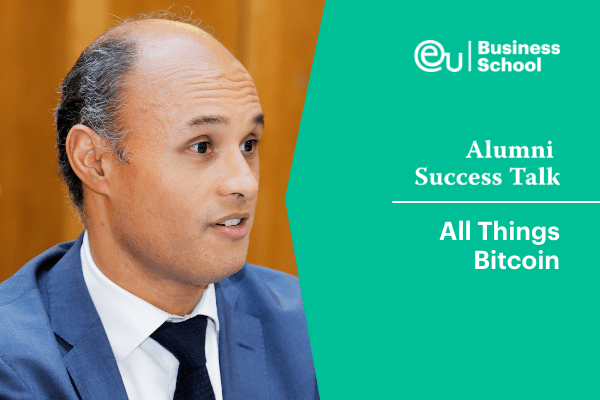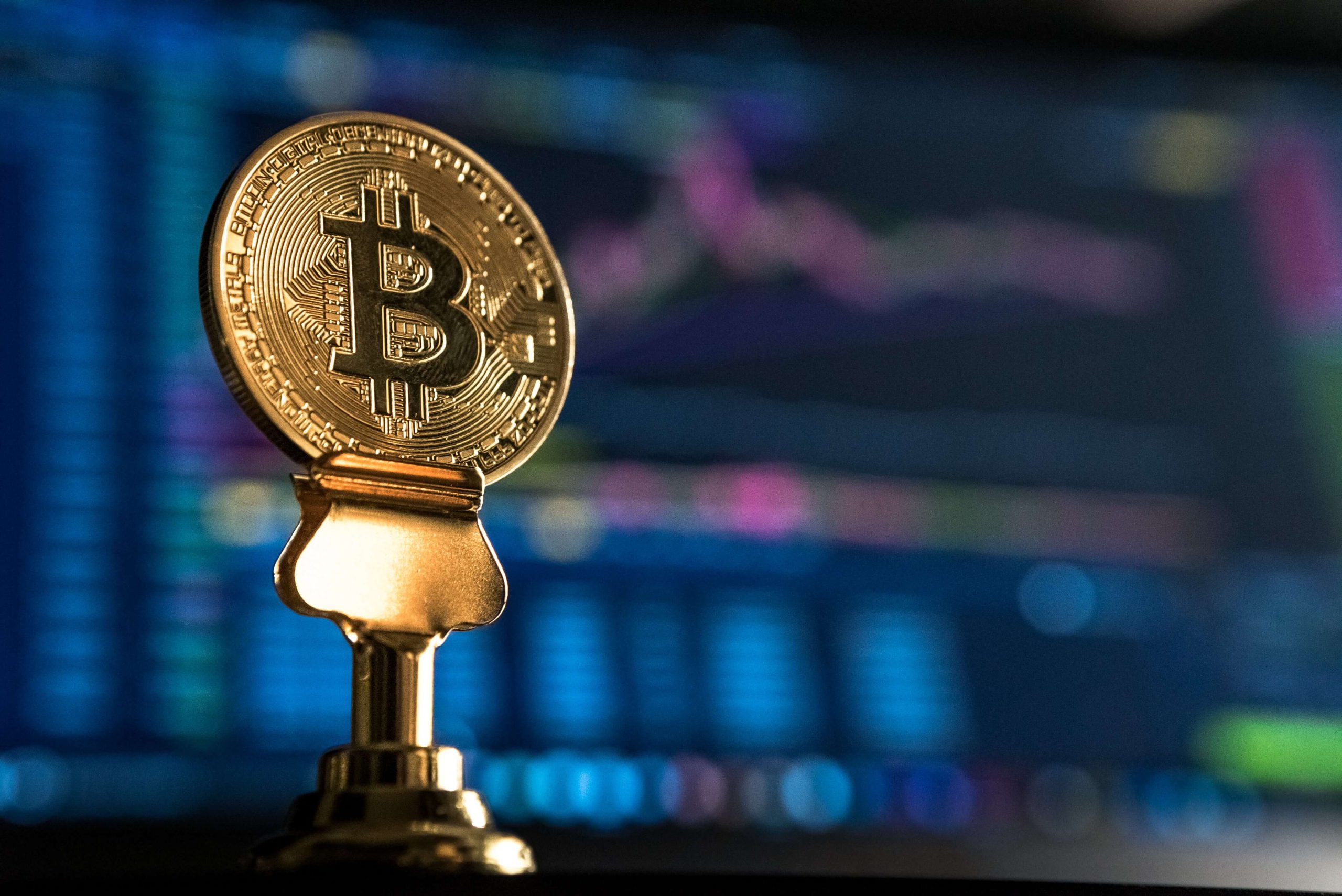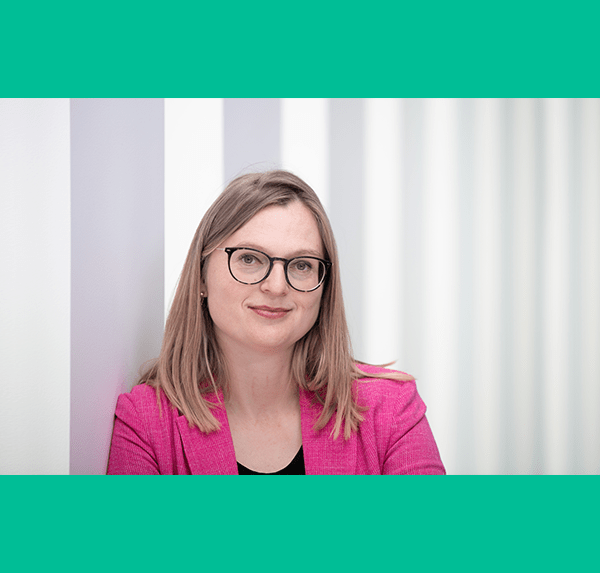EU Alumnus Iskandar Vanblarcum Explains All Things Bitcoin
Iskandar Vanblarcum graduated from EU Business School in 1994 with a Bachelor’s in Business Administration (BBA). Immediately after graduation, he secured a role as a fixed income trader, and from there moved into FX trading for some of Europe’s leading financial institutions. Today, he is the Head of Sales and General Manager for Europe for OKCoin, one of the largest cryptocurrency exchanges in the world.


He spoke to an audience of EU alumni, students and faculty members as part of our Alumni Success Talks series, sharing the insights he’s gained from over 30 years in the financial industry.
He began by saying that he didn’t want to make his lecture too technical: instead, he wanted to encourage his audience to think deeper and more holistically about blockchain, to look at Bitcoin in the context of what it could do to our society, how it could change in the future, and how they could get involved.
Keep reading to find out his answers to questions like, is Bitcoin money? Who is buying Bitcoin? And is Bitcoin unstoppable?
What is Bitcoin?
To kick off the talk, Iskandar shared a 90-second video explaining the fundamentals of Bitcoin with his audience. The video’s creators, WeUseCoins, give the following definition:
“Bitcoin is the first decentralized digital currency. Bitcoins are digital coins you can send through the internet. Compared to other alternatives, Bitcoins have a number of advantages. Bitcoins are transferred directly from person to person via the net, without going through a bank or clearinghouse. This means that the fees are much lower. You can use them in every country. Your account cannot be frozen and there are no prerequisites or arbitrary limits.”
Properties of Bitcoin
- Autonomous
- Programmable
- Fungible
- Portable
- Electronic
- Verifiable
- Scarce
- Finite
Is Bitcoin money?
There is some debate as to whether Bitcoin, or cryptocurrencies in general, are “money”. In her alumni talk on the Fundamentals of Blockchain, Kathrin Wolff revealed that she prefers the term “cryptoassets”, as you can’t pay your mortgage with Bitcoin. Iskandar’s audience was split 74:26 the other way, with the majority of attendees believing Bitcoin to be a type of currency – and he agrees, despite it not being legal tender in most countries around the world.
One exception to this is El Salvador, where Bitcoin was made legal tender in 2021. The three main factors that played into this decision were:
1. Remittance – El Salvador are looking to increase their efficiency when it comes to international remittance. Right now, approximately 20% of the country’s GDP comes from remittance (sending money to El Salvador from other countries). However, international payments can take a couple of days to go through, and there are fees associated with international transfers. Sending Bitcoin eliminates the time delay and extra charges.
2. Wealth Distribution – El Salvador is a developing country. 70% of the population doesn’t have a bank account. With Bitcoin, all you need to share money is a device with internet access, making access to funds easier.
3. Politics – The government inEl Salvador doesn’t want to rely on the US dollar. Their goal is to launch a $1bn bond in Bitcoin to fund their deficit.
These reasons are all highly specific to the economy in El Salvador, but their example shows Bitcoin does have the potential to become legal tender in more countries in the future.


Who is buying Bitcoin?
Looking at the data collected from Okcoin’s user base, the largest group of active traders on the exchange is the under-40s, specifically those aged 20-25. Iskandar attributes the growth of this demographic to their mindset, who view Bitcoin as an investment opportunity.
As we have already established, Bitcoin is a finite asset. Out of a possible 21 million Bitcoin, somewhere between 18-19 million are currently on the market, but 13 million of them have not moved. This means that instead of buying and using Bitcoin, people are just holding it in their portfolios, waiting to see how the market will evolve in the future.
Is Bitcoin unstoppable?
Because Bitcoin is a finite, self-governing asset, it has the potential to become a valuable collector’s item.
After the big market crash in 2021, a single Bitcoin was worth $70,000. That made it the sixth most valuable asset in the world at the time, more valuable even than silver, which caught the attention of a lot of investors. The question everyone was asking was: could one Bitcoin go for $100,000, or maybe even more? Iskandar thinks it could.
Today, Bitcoin retains its position in the top 10 most valuable global assets. However, its future is not completely assured.
Risks of Bitcoin
- Technology – there are more than 400 developers continuously working on the Bitcoin protocol, which increases the risk of a bug in the code.
- Concentration – a big asset manager may seek to monopolize the market by buying the majority of the Bitcoin, which is a finite asset.
- Political – Bitcoin is a political asset, and regulators in Europe and the US are cracking down on the misuse of Bitcoin in their respective jurisdictions.
- Adoption – there is a risk that people may stop buying/using Bitcoin if a better cryptoasset or investment opportunity comes along, rendering it obsolete.
Are you interested in a career in crypto? Check out the MBA in Blockchain Management from EU Business School, just one of our innovative programs designed to respond to the latest needs of business. The fintech market is evolving rapidly thanks to developments in blockchain technology. Our course has been specifically designed to give postgraduate students an in-depth understanding of the fundamentals of blockchain, and the skills to critically examine how transparent technologies are changing the way we do business.











